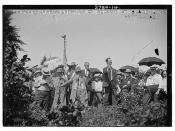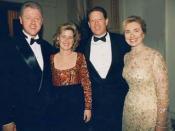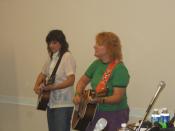Labeling Our Minds Our country was founded on some specific principles. We are granted the freedom of speech and expression. However, the music industry's rights seem to be frequently compromised. Like any other media, music, in all of its forms, such as concerts, CDs, and various paraphernalia has been criticized by the government. The existence of advisory labels compromise the Artist's rights to free speech and expression, limit the Artist's profits and grants the government too much control over what we hear.
The major leap in music restriction began in 1986 with the PMRC (Parent's Music Resource Center) hearings held by Tipper Gore (Buder 3). "Parents need to know more about the content of the music that their children are listening to."ÃÂ (Scott 9). The labels were at first voluntary. "We don't want you to have to ask Big Brother if its okay what we listen to."ÃÂ Tipper Gore stated (Buder 7).
If an album contains "explicit content"ÃÂ, it is nearly impossible to find a company to produce the music without the application of a warning label (McCaffe 5). Over 120 of the world's leading music companies in the world including Virgin require the application of a warning label on albums with explicit language or explicit cover art (McArthur 190).
Coffey 2 However, if the Artist chooses to re-design their cover-Art, it can cost near 10,000 per 1,000 CDs changed. (Buder 10). Also, if Artists do manage to get a label, finding a market for their music will be difficult. Wal-Mart, the largest music retailer in the world, does not sell any albums with an advisory labels on the cover (Enon 1).
This effectively proves that to survive as a musician, the music labels are not voluntary. Therefore, the rights to musician's profits are impaired. Without an equal opportunity to attain money like everyone else, this is a direct violation of the Constitution. ""æThat no man shall have favor among the courts, nay, we shall all be equal"à(Buder 7). Frequently, politicians that believe that we live in a society where anybody is wrong if so much as a whisper escapes their mouth that offends someone target bands such as Korn, The Indigo Girls, Prodigy, The Village People, and 2 Live Crew (McCaffe 4).
A recent scandal in Atlanta, Georgia involved the Indigo Girls. The group was scheduled to perform at Lanesville High School. However, the school canceled the concert because of an offensive lyric in the song, "So Real"ÃÂ. "Songs like this are completely inappropriate for a school environment"ÃÂ (Lester 9).However, when the Indigo Girls offered to omit this song and any others, the school officials and the city would not let the Indigo Girls perform. The scandal at hand was that the leaders did not want the high school to be exposed to the group because of the sexual preference of Sarah and Annie, two members of the band (Moore 9).
"I certainly don't want my students to be handed Satanism and homosexuality on a silver platter in my school"ÃÂ commented one teacher who refused to give his or her name (Buder 8). Coffey 3 Satanism has also been connected to an artist who has created a revolution by himself. The name of the artist is Marilyn Manson. He is known for his support of transvestites, Satanism and other "politically incorrect"ÃÂ traits (Moore 7).
He has been mobbed by citizen's protests nearly twenty times in the last ten years. However, the city council failed to take civil action because they called the mobbing "an act of free expression"ÃÂ (McCaffe 11). Violence of this type is not considered free speech.
At the same high school, t-shirts containing Marilyn Manson and Korn were banned. "When you come back from winter break I don't want to see you wearing that metal crap"ÃÂ (Buder 19). However, t-shirts containing Christian messages were not banned. Satanism is a legitimate religion. Christianity is also a legitimate religion. However, politicians and the general community have favored the Christian religion.
Music labels used to be a hindrance for many music companies. However, about seven years ago the music industry saw an opportunity to make some more money. The average consumer of this "explicit"ÃÂ music is looking for something offensive in the lyrics. This can become complicated when searching for some music with so many choices. However, with a music label that tells you the sort of content on the CD, the decision is simple (National 8). The labels today are little more than an advertising scheme. The labels help the Artists market their music to their target audience (National 9).
Coffey 4 The Parent's Music Resource Center, the inventor of the labels, has also been shown to be racist. In 1997, M.C. Hammer and Dr. Dre, popular rappers were both found on the hotline for "inappropriate lyrics"ÃÂ. The tape warned parents of violence and explicit language. However, two other white artists, Green Day and Metallica were not on the hotline, even though they had the same sort of material on their respective albums and the added effect of drug use. (National 9).
Various groups have emerged to combat the PMRC's rating system. Mary Morello, mother of Tom Morello, guitarist in the often targeted "Rage Against the Machine"ÃÂ invented Parents for Rock and Rap, which search out issues and incidents and protest and/or help.
Also, with Wal-Mart not selling music with explicit lyrics, artists are forced to either be unsuccessful in landing a successful market for their music or be forced to edit their music. (National 12) To be forced to edit your music to become successful is wrong and we should not tolerate it.
In order to effectively put an end to this injustice, we will need other groups such as these to prevent this unconstitutional atrocity. Music is usually targeted by various politicians which comment on its content. This, however is a violation of the artists constitutional rights. Therefore, it is the duty of the country to combat such nonsense.





